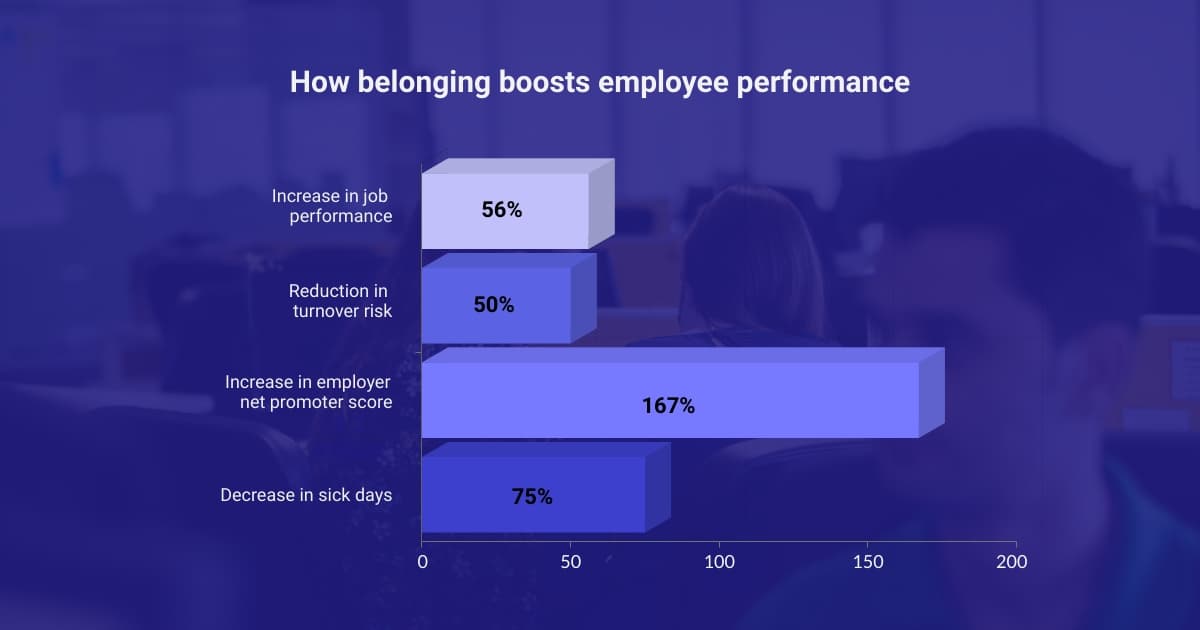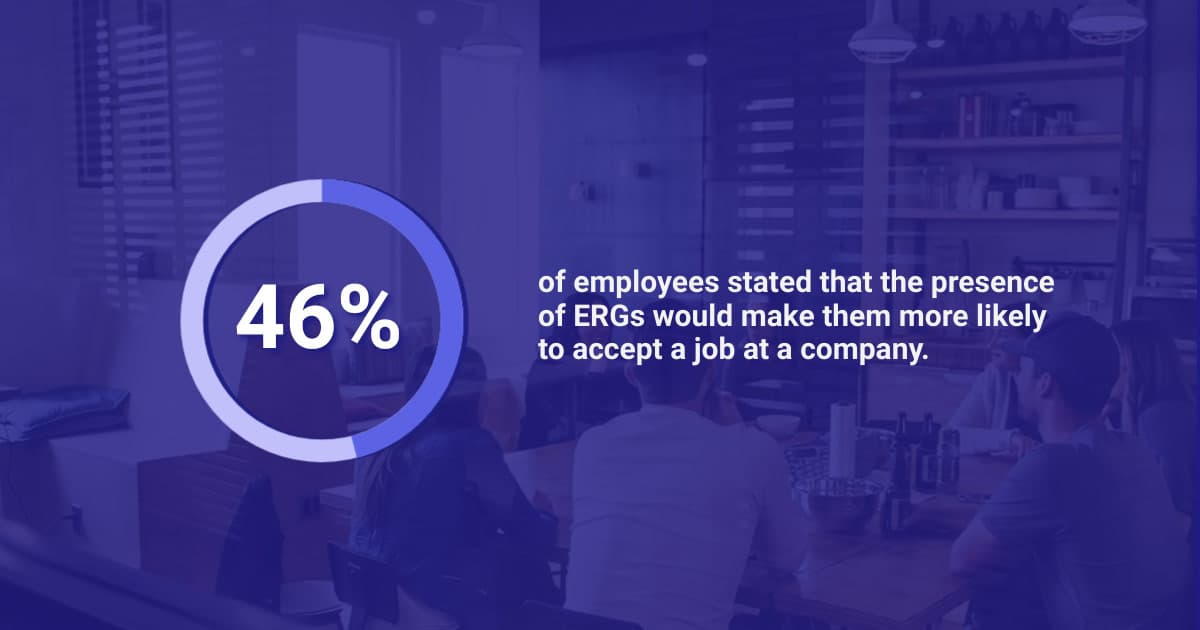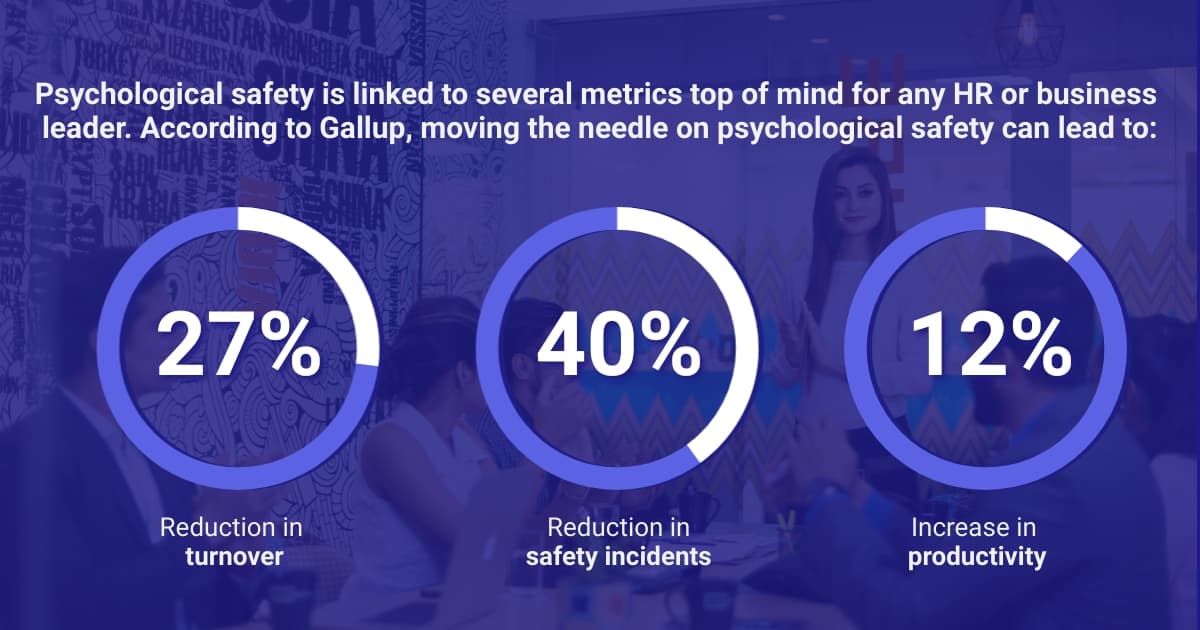Creating a Sense of Belonging in the Workplace

Feeling like part of something bigger is a fundamental human need. In the workplace, that translates to belonging – a sense of connection, value, and acceptance.
An employee who feels a sense of belonging will feel comfortable sharing their ideas, asking questions, and taking risks.
But why is it important for your business? Research has shown that a sense of belonging in the workplace fosters engagement, boosts productivity and business performance, and even reduces turnover.
Keep reading to learn how your organization can cultivate a work environment where everyone feels valued, respected, and empowered to be their authentic selves.
The impact of belonging at work
Employees who feel that they belong at work are happier and healthier people. Research has found that workers who feel a strong sense of belonging at work are more likely to be productive, feel connected to their colleagues, and have a lower risk of experiencing burnout.
On the other hand, a lack of belonging triggers a feeling of "belonging uncertainty"Opens in a new tab. Belonging uncertainty is when someone “suffers from doubts about whether one is fully accepted in a particular environment or ever could be.” Feeling doubtful of their place at work can cause a person to feel defensive and uncertain of their surroundings.

Unsurprisingly, someone who feels defensive and uncertain will disengage from their work and be less willing to help out their colleagues. Most importantly, an employee’s mental and physical well-being will suffer. Employees who feel like they can’t be authentic at work are more likely to experience social isolation, which can lead to anxiety or depressionOpens in a new tab.
So, what does this mean for your company? If just one person feels this bad, imagine the domino effect that can occur and permeate your culture. Disengaged, unhappy employees are not good for productivity, retention, and profits. Ensuring workers feel a sense of belonging is a win-win for companies and employees.
Tips for fostering belonging in the workplace
While some of our advice applies to senior leaders and requires systemic executive change, small things in every employee’s power can improve a colleague’s sense of belonging. Encouraging everyone to bring your whole self to work is one such impactful approach. Let’s take a look.
Respect differences big and small
We’ve all heard the saying, “The world would be a boring place if we were all the same.” The same applies inside your organization! Acknowledging and supporting each unique individual is also good for your business: different perspectives boost creativity and innovation.
Everyone’s circumstances outside of work are different; make it easy for people to be themselves by promoting a healthy work-life balance. Family members could be sick, or they might be gearing up for a big move.
If your goal is to create a greater sense of belonging, it’s your responsibility to create a safe, welcoming space where employees don't have to hide who they are or what they are dealing with. In practice, make it easy for employees to access reasonable accommodations and work flexibly without permission.
Encourage employees to share their cultures and the food and celebrations that come with it. This doesn't just spread awareness and educate others, it also sends a signal that employees are safe to bring their whole selves to work.
Another small (and cost-effective way) to help people feel that they belong is to acknowledge that we all have different work styles and process feedback in our own way. Train managers to talk with their direct reports to uncover what they can do to make them feel supported.
Invest in ERGs
Download our exclusive report to learn three ways to build a culture of belonging!
Employee resource groups offer a safe space for shared identities to gather support and advocate for one another. Examples of ERGs include working parents, LGBTIA+, and veterans.
These groups can make a meaningful change in experience for an employee’s sense of belonging, especially if they are part of an underrepresented group. Just the presence of ERGs at an organization can make an employee 31% more comfortable being their authentic self at work and 23% more likely to feel like they belong.

While this is all good news for combating belonging uncertainty, employers should be aware of their responsibility in creating these safe spaces. ERGs are often employee-led. Unfortunately, our research has found that the underrepresented groups that may benefit most face the burden or pressure of starting a group.
Organizations must recognize that an employee's participation and leadership in creating and maintaining these space spaces is labor. Compensating ERG leaders is a way to acknowledge and encourage their commitment and contributions that will ultimately help your organization grow.
Celebrate life events
For anyone who knows what it feels like to have a major life milestone go by without anyone at work celebrating it, you know how isolating that can feel. In our increasingly virtual world where we work from our living rooms, it’s impossible to ignore the blending of work and an employee’s personal life.
Beyond building belonging, research shows that celebrating life events in the workplace leads to a 23% increase in an employee’s mental health.
Sending a colleague a message to acknowledge their achievement or getting the team together to celebrate a milestone goes a long way. Workhuman’s Life Events® platform allows organizations to control and customize the events they celebrate, broadening a chance to acknowledge their employees for where they are in their personal lives – whether that looks like adopting a kitten, running a 5k, or buying a house.
Encourage communication, ownership, and growth
This trifecta of behaviors works interconnectedly to deepen an employee’s sense of connection and value. A culture of open communication and transparency allows employees to bond and connect over shared excitement or concerns. It is a way to see and be seen; positively contributing to an employee’s feelings of belonging.
Autonomy – when workers are allowed to work in a way that suits them best – builds investment by providing employees with ample opportunities to share their ideas and feelings with others. Because they feel in control of their work and have more chances to show their authentic self and ideas, autonomy provides a major boon to psychological safety.
Learn how you can build psychological safety in the workplace and improve the employee experience!

Investing in your employees by providing accessible learning and growth opportunities starts a positive chain reaction, similar to employee recognition. Showing your employees that you care about their skills and career journey helps them feel connected and a part of your workplace culture.
Your company’s commitment to them and their career ensures employees feel connected to the organization and ready to invest their talent back into the business.
Say “Thank you”
When an employee can see the impact they are making, it helps them feel valued – a major component of feeling a sense of belonging. Appreciating an employee’s efforts also ensures that your workers feel and experience more positive than negative interactions at work.
Our research with Gallup found that recognition is most impactful when it’s fulfilling, authentic, personalized, equitably disturbed, and embedded in an organization’s culture. Social Recognition® from Workhuman® makes it easy to monitor recognition patterns to ensure fairness and share messages on a social feed that encourage a positive chain reaction.
Have fun together
To feel like you are a part of a team, you have to endure shared experiences. And what better way to do that than to have fun? Working together towards a low-stakes goal, like solving a virtual puzzle, creates camaraderie and builds friendship.
There’s an additional benefit to creating close relationships that boost your business: As per World Economic Forum research, ,' having a best friend at work decreases safety incidents and increases profits Here's What the Research Says About Workplace FriendshipsOpens in a new tab .
Here are some tips for creating opportunities and activities that are inclusive:
- Try your best to schedule these activities during regular work hours. Don’t make your team choose between living their life outside of work or showing up to a team-building event.
- Team-building activities don’t have to be in-person. There are plenty of virtual games and activities your team can partake in during small windows of time. Consider starting a book or podcast club or setting up recurring virtual coffee breaks.
- Make these opportunities optional – you never know why someone might not be able to attend or want to participate in a certain activity. Peer pressure will never feel inclusive.
Wrapping up
Fostering a sense of belonging is about building a workplace culture where everyone feels valued and supported. By prioritizing open communication, celebrating contributions, and creating spaces for connection, you can cultivate a thriving work environment that fuels engagement, innovation, and business success.
About the author
Alicyn Zall
Alicyn Zall is a writer dedicated to creating a more equitable and fulfilling workplace. With a focus on actionable, data-driven insights, her work empowers individuals and organizations to foster positive change. In addition to her contribution at Workhuman, Alicyn has served as an editor at Harvard Business Review where she developed books and articles about mental health and the future of work.